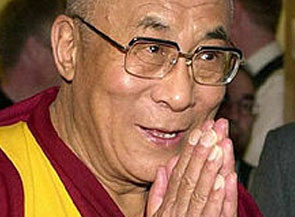 “Can compassion be trained or taught?” has been the basis of many decades of research and study by Tenzin Gyatso, 76, the 14th Dalai Lama. Tenzin is believed to be the reincarnation of an ancient Buddhist leader who epitomized compassion and today’s gracious act of compassion fortified that belief.
“Can compassion be trained or taught?” has been the basis of many decades of research and study by Tenzin Gyatso, 76, the 14th Dalai Lama. Tenzin is believed to be the reincarnation of an ancient Buddhist leader who epitomized compassion and today’s gracious act of compassion fortified that belief.
The Templeton Prize, founded in 1972 by the late Sir John Templeton, honors “entrepreneurs of the spirit” – outstanding individuals who have made exceptional contributions toward expanding our visions of human purpose, not through any particular faith, but to affirm life’s spiritual dimension through diverse manifestations of the Divine. Winners may have their contributed through insight, discovery, or practical works.
As reported by The Templeton Prize website, here,
The Dalai Lama is no stranger to honors and accolades, with scores to his name. In 1989, he was awarded the Nobel Peace Prize for his advocacy of nonviolence as the path to liberation for Tibet. He becomes the second Templeton Prize Laureate to have also received the Nobel Peace Prize; Mother Teresa received the first Templeton Prize in 1973, six years before her Nobel.
He often notes that the rigorous commitment of Buddhists to meditative investment and reflection similarly follows the strict rules of investigation, proof and evidence required of science.
Among his most successful efforts is the Mind & Life Institute, co-founded in 1987 to create collaborative research between science and Buddhism. The Institute hosts conferences on subjects such as contemplative science, destructive and healing emotions, and consciousness and death. While initially beginning as quiet academic affairs, they have evolved into enormously popular public events.
The Dalai Lama has authored or co-authored nearly 70 books of interest, including the beloved The Art of Happiness and The Universe in a Single Atom: The Convergence of Science and Spirituality.


